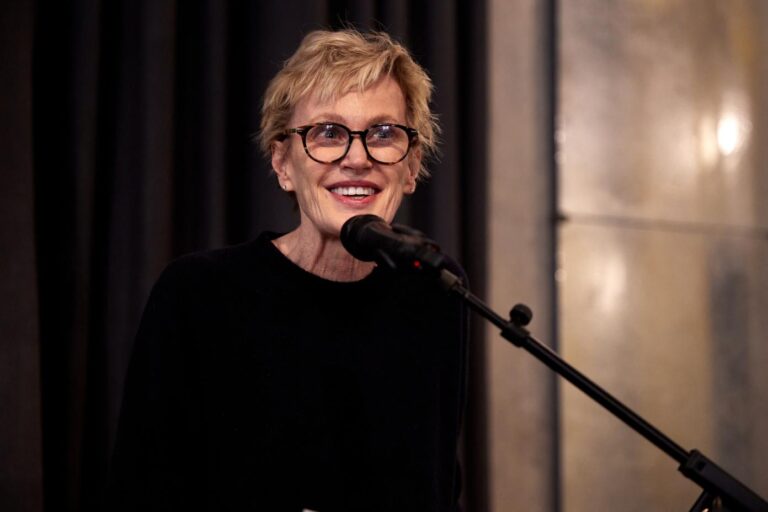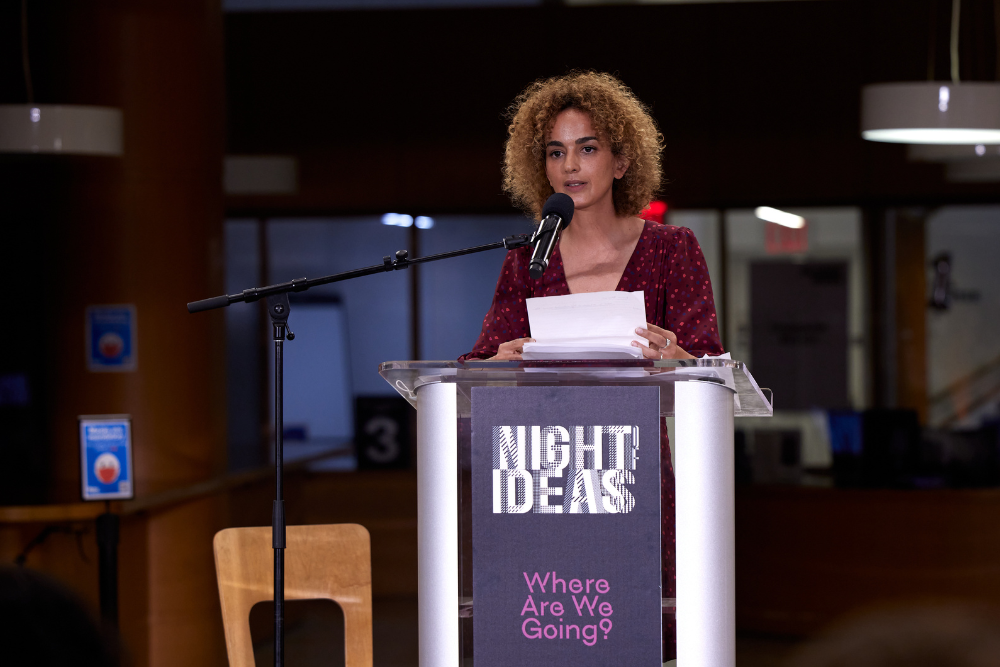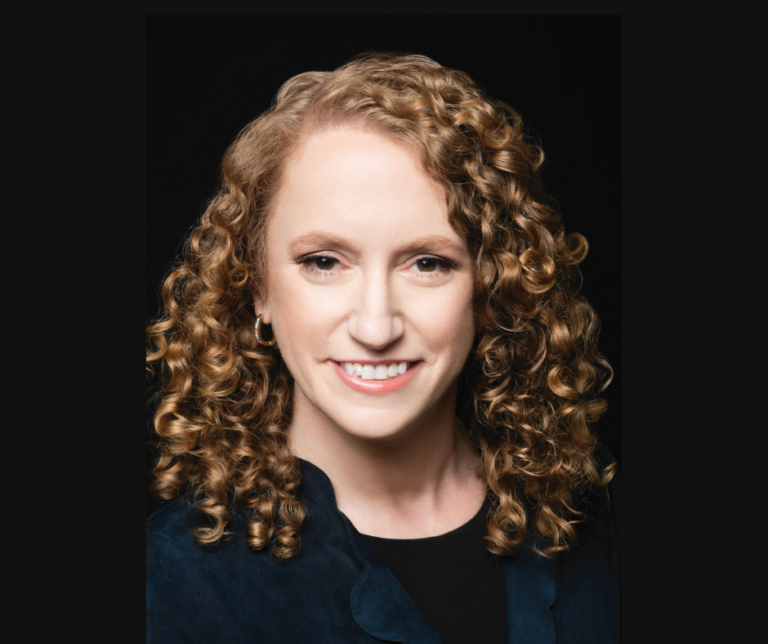
Leïla Slimani: “When I Write, I Don’t Know Where I’m Going”

© Argenis Apolinario
By Raphaël Bourgois
“I don’t know where I’m going, so I write,” was how novelist Leïla Slimani concluded her moving speech at the Night of Ideas 2022 at the Brooklyn Public Library in New York. In an interview with the Villa Albertine magazine, she discusses the issues that run through her work and her commitments: feminism, immigration, identity, racism, and, of course, the role of literature.
We are currently living in very uncertain times, crippled by war, a pandemic, a global climate disruption… In such a context, asking, ‘Where are we going?’, as we do on the Night of Ideas, might seem dizzying. How can literature remain relevant?
In my view, the role of literature is always the same, and it isn’t contingent on human history. It is at once absolutely essential and absolutely trivial. Nothing is more important than the fight for the individual, for the intimate, for human complexity, for beauty, for the ability to be touched. That being said, what writers do is useless. Writing a novel will not feed a child; it will not warm someone who is cold; it will not heal someone who is dying. Literature always lies there – in the tension and balance between the absolutely essential, which makes us human beings, and something that is deeply trivial.
So when you sit down at your desk to write, do you try to shut out the sound and fury of the world?
No, I don’t shut it out at all – on the contrary, it’s always with me. How can one avoid it? Wherever one looks, whatever the period, violence is always lurking somewhere. It’s also found, to various degrees, in books and in their characters. Anyone who loves literature is familiar with the violence of the world. Every writer, whether it is Homer or William Faulkner, is well aware of it, and all authors carry it within themselves. So, no, it is there with me, and even if it sometimes feels, as I’ve just said, trivial, pointless, and almost indecent to be shut away writing books all day long, I also often feel that it might be the only thing in the world that makes any sense – to keep fighting for knowledge, awareness, emotion, sharing, and emancipation through literature.
When you start on a new book, do you ask yourself where you are heading? Is that something you need to settle beforehand?
No, not at all. I don’t know where I’m going when I write. I’m in the dark throughout the whole process – in fact, that’s precisely what I like, because I love the realization that everything is gradually getting clearer. It’s like being in a room that’s in total darkness, and as your eyes get used to it you can make out the outlines of the furniture. Writing is a bit like that: I move forward according to narrative twists and surprises. I don’t really have a pre-established plan, although of course I have an initial idea of the characters, their outlines, and their fates. As I write, through the magic of language, they end up having lives of their own and leading me where they want me to go. Their lives are totally their own.
Notions such as hospitality, solidarity, and reciprocity feature strongly in your books and your public stances. How can we best defend them today?
They are, indeed, values that I have always defended, for a very simple reason, namely that I’m an immigrant myself. I left my country to live in another, and although some people offered me hospitality and made me feel welcome, I’ve also experienced rejection and racism, albeit to a lesser extent than others. My homeland, Morocco, is also a land of emigration, a country that a lot of people around me wanted to leave. Why do people leave their homeland? What sparks the obsession with elsewhere? Those are questions that have always intrigued and saddened me. I might add that the concepts of charity, welcome, and hospitality toward those who have less run deep in Morocco and in the Muslim culture. So I have been preoccupied and obsessed with these questions for the last twenty years. But hospitality only makes sense to me if it applies to everyone, whatever the color of their skin. What revolts me today is the feeling that some immigrants are more worthy than others, that there are people who deserve to be called refugees when others are just migrants. To put it clearly, racism, selection and discrimination have even wormed their way into our humanitarian relationship with the world.
“Regardez-nous danser,” the second book in your trilogy “The Country of Others,” was recently published in France. It’s a saga based on your own family history, and this latest opus is set in the 1960s-70s, an era we now see as one when all kinds of future were still possible. In your opinion, how did people back then reconcile the personal and the historical?
The book is set in the late 1960s, a period we tend to over-idealize because, both in the West and in what we call the Global South (i.e. countries such as Morocco), it was a time of idealism and hedonism when it seemed as if young people would change the world, revolutionize sexuality and interpersonal relationships, and put an end to war… But while I was researching that period, I soon realized that it also had some sinister aspects. I should specify that although I did a lot of meticulous work, the hardest thing was then to put those great historic movements to one side. Because novels are essentially about individuals, and most of them are blind as to the present they live in. Our own era and society are mostly beyond our grasp, and we are much more often obsessed with very personal and selfish issues than with the course of history. We’re far more interested in whether we will get a promotion at work, or whether the woman we love will love us in return, than in how we can best be of service to others. I’m not passing judgment when I say that; it’s just what human beings are like, and perhaps it’s also how we manage to cope with the world. To get back to my latest book, it’s about some endearing characters who want to be good people but realize that the world is actually so vast, and the issues they come up against so complex and confusing, that most of the time the truth, and the very notion of good, eludes them.
Those years, the late 1960s and early 1970s, are also associated with the women’s liberation movement, and female characters are at the heart of your novels. But there is a discourse that tends to oppose the West, where women have supposedly been progressively liberated (although there is still a way to go), to the Global South, specifically to countries of Muslim culture where, after a golden age, the status of women has regressed. What is your view on that subject?
It’s absolutely false. The period described as a ‘golden age’ of women’s liberation actually concerned very few women – members of the first generation of independent women who had middle-class backgrounds and access to higher education. It is true that some women experienced a kind of liberation that was new to countries such as Morocco, because they could not only study, but could wear skirts, go out at night… Then the movement spread to working-class and rural communities and began to take different forms. For a young woman in a small town in central Morocco, liberation obviously didn’t mean smoking cigarettes on café terraces, but simply going to school. So what is regarded in the West as symbolic of women’s liberation might be less visible, but emancipation in a broader sense was nonetheless there. Moreover, middle-class women like Aïcha, the character in my latest novel, may have accessed higher education, but society still required them to do all the things their mothers had done, namely shopping, housework, cooking, child care… The fight we are still engaged in today is a fight to ease the burden, to share the household chores more equitably. So another result of the so-called golden age was that those women became crushed under the weight of their demands.
More generally, the issue that comes to mind when reading your book is how the so-called minorities – French descendants of colonized countries – are viewed in France today. The issues of identity, integration, and the place of Islam have been debated for decades and are brought to the fore again in every election. Do you see any evolution on those issues?
To be frank, racism continues to be a real problem in France. I have lived here for twenty years, and for all that time the same subjects have been discussed: national identity, immigration, former President Nicolas Sarkozy’s speeches about Africans never making history, the irrational fear of the replacement of the French population by Muslims, whether girls and women should be allowed to wear the veil. I’m sorry, but I can’t think of a better word to describe those debates than “racist.” And to be honest, I’m sick of it. What sense does it make to refer to us – immigrants from the Maghreb, for example – as a “minority”? We’re not a minority, we’re French. What’s truly astounding is to harp on about the values of a Republic that is supposedly blind to differences, to affirm that we are citizens above all else and should not define ourselves by our religion or the color of our skin, only to refer to us as “visible minorities,” people of I-don’t-know-what origin! French society, where 30 percent of people now vote for far-right parties, should take a long, hard look at this racism, which is generally described as latent but is becoming increasingly overt. We have to acknowledge the problem of racism, rejection of others, and hatred for a section of French society. It could also stem from a lack of awareness of history and geography, a lack of interest in other people’s history, in what those people have contributed, contribute today, and will continue to contribute to this country. The truth is that I no longer want to tread carefully, to look for explanations or excuses, because the result of all that is that a lot of people around me, who came to France to make a life for themselves, have now decided to leave. There was an article in the New York Times on the subject recently, and I can confirm that it’s true. People of my generation, in their early 40s, are packing their bags and going back to Morocco because they can no longer endure the prevailing discourse.
You said at the beginning of our interview that literature was both essential and trivial. There are nonetheless reasons to hope, with a form of decompartmentalization in recent years, a greater interest in Francophone literature from outside France. The latest Prix Goncourt – the most prestigious literary prize in France, and one that you were awarded in 2016 – went to Mohamed Mbougar Sarr, a Senegalese author. Don’t you think that helps to broaden people’s horizons and bring these issues into the public arena?
Yes, of course, and that is exactly what we endeavor to do, whether it’s him, or me, or others, in our work. But the main problem is that we’re only preaching to the converted. There’s no point being naive. When I win the Prix Goncourt, or when Mohamed Mbougar Sarr wins the Prix Goncourt, we’re immediately subjected to torrents of abuse from people telling us we only received it because we are black or Arab, and that we can never represent France. You know, if it did any good to tell racists that racism is wrong, we wouldn’t be in the situation we’re in now. It needs a much more in-depth approach, and maybe even a more aggressive one. I see writers in the United States today, such as Ta-Nehisi Coates, whose discourse is very forceful, very sharp. Maybe we do tend to beat about the bush in Europe. We’re afraid to tell it how it is in case we permanently antagonize other people. I think we should be more upfront in this fight.
Leïla Slimani is a French-Moroccan writer. In 2016, she received the Goncourt Prize for her novel Chanson douce and has been an Officer of the Order of Arts and Letters since 2017. Her novels tackle questions of immigration, racism, identity, and defend the women’s rights. She has also been a representative of the International Organization of La Francophonie since 2017.


